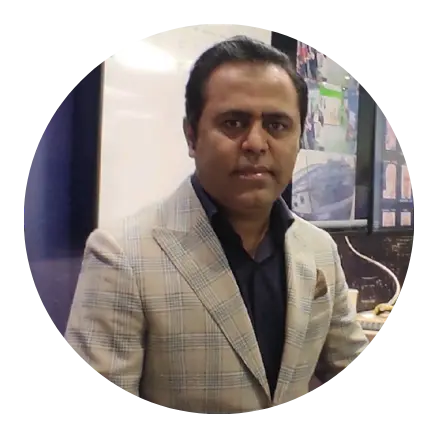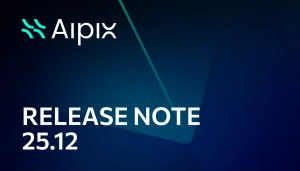Deep Insights and Smart Telecom Strategies Shaping the GCC With Ali Shafaqat, CSO at Smarttive
The MENA region is undergoing a remarkable technological transformation, driven by ambitious national visions, accelerated digital infrastructure projects, and a clear commitment to smart city development, AI, IoT, and sustainability. Main Telecom Strategies in MENA are the most intensive: from the futuristic skylines of the Gulf to emerging tech hubs across North Africa, this part of the world is fast becoming a global benchmark for innovation, connectivity, and digital-first economies.
At the heart of this transformation is Smarttive, a leading regional systems integrator and strategic partner of Aipix in the MENA region. As Aipix’s primary provider in the GCC and beyond, Smarttive plays a vital role in bringing next-generation AI-powered and computer vision solutions to life across sectors such as government, telecom, transport, agritech, and tourism. With deep-rooted market presence and strong partnerships, Smarttive is not only driving adoption of advanced technologies, but also shaping the ecosystem for scalable, sustainable impact.

In this exclusive conversation, we speak with Ali Shafaquat, CSO at Smarttive, leader and a visionary voice in regional tech enablement. Ali Shafaquat offers firsthand insights into the Telecom Strategies in MENA and dynamics of the GCC market, key verticals for growth, and how companies whether global OEMs or startups can successfully navigate and thrive in this high-opportunity environment.
Whether you’re a looking to enter the Gulf market or get insights of Telecom Strategies in MENA, an established OEM seeking the right local partner, or simply curious about the digital future of the Middle East this discussion offers a deep dive into a region full of opportunity and innovation.
Anastasyya: Greetings everyone. Welcome to another episode of the Aipix podcast where we’re taking a deep dive into the insights of the telecom sector across the countries of Gulf Cooperation Conceal. As the industry accelerates the adoption of new technologies, telecom operators are increasingly challenged or provided with an opportunity through forward-thinking innovations.
Today we are honored to be joined by special guests from Smarttive, a global provider of new smart technology solutions, basically focused on urban safety and operational efficiency. We’re really pleased to welcome you, Ali.
Ali: Hi.
Anastasyya: Ali brings strong experience in business strategy and innovation, especially in AI, video analytics, and IoT, with a solid foundation in global market expansion and tech development. And from the Aipix side we have Alex Baiko.
Alex: Hello.
Anastasyya: Alexander is our solution architect. He plays a pivotal role in strategic product development and spreading innovation, with strong expertise in the telecom market and video surveillance market. Smarttive heads many projects across the telecom sector and telecom strategies in MENA, especially focusing on smart technologies like IoT and smart security solutions. So let’s start with a quick assessment of the market.
The first question is: What is the current state of the telecom market, and how are telecoms adapting their offerings according to the demand formed by industries and consumers for new smart technologies?
Ali: Thank you very much for giving me the chance to speak to you. I believe it’s a very interesting topic. Based on our experience in the market, there are some insights we can share. The telecom sector in this particular region is definitely booming. We do come across news that there are certain challenges, but typically, talking about the GCC, the telecom sector has really seen very good progress in recent years, especially vertical growth, as telecom is expanding into value-added solutions and becoming master system integrators, carrying along an army of integrators who have expertise in different verticals, like us working primarily on smart security and IoT. Others work on different verticals. As for the business models and growth, I think telecom has really seen very good growth in the different vertical markets in the recent past.
Alex: Great to hear. Ali, in your opinion, which telecom services are currently developing most actively in the GCC? Maybe 5G, IoT for everyday life, smart mobile, financial services?
Ali: Although I want to stick to my area of expertise, telecom has definitely seen a lot of growth in 5G. For example, in the UAE we have blanket 5G coverage: you have excellent 5G wherever you go. The same applies to some neighboring countries. Saudi, being a large country, might not have blanket coverage but has good enough coverage in urban areas. In the countryside, it might still be 4G, but the coverage is decent.
Fintech has seen a lot of growth globally, and the GCC is no different. IoT based on NB-IoT is a huge success in the market. We play a pivotal role, especially in the UAE and Saudi markets, collaborating with leading telecom providers. We’ve made a major impact and seen increasing demand, although it took a while to take off, the past couple of years have seen strong growth.
Smart homes have become more of a commodity business because there are so many offerings. In the UAE market especially, all new development projects include smart home tech. If you move into a new project, it’s already there. So adoption is rated pretty high.
Alex: How is the role of telecom companies changing? Are they still just a data channel between customer and internet, or have they turned into solution integrators?
Ali: Like I said, telecom is not a typical telecom anymore. The region still has a lot of voice business, indeed SMS business, not so much but voice is definitely there. Vertical growth has been significant. Telecoms today are more like master system integrators or turnkey solution providers. They have teams of integrators and you can talk to them for a complete solution, whatever you’re looking for, they’ll have an answer. This applies across the region.
Alex: Which cloud, edge, or AI solutions are most frequently requested by corporate and private segments? And which industries are at the forefront of shaping demand – banks, fintech?
Ali: In this region, the government is the biggest buyer by far. Then the banking sector, and then retail. Telecom has made a difference in all three. Governments rely heavily on telecom for their initiatives. In banking, several banks have collaborated with telecom to acquire various solutions.
As for cloud, data security is a global challenge and we’re no different. Data has to reside locally. Whether you’re talking UAE or Saudi, everyone asks where they will store data. All cloud providers need local instances and local means within the country. Etisalat has its own cloud. STC in Saudi has theirs. Microsoft Azure hosts data in-country. AWS is present in the UAE, and all providers like Google, Oracle, AWS are either present in KSA or launching soon.
Governments are investing heavily in AI. Without cloud and large-scale data centers, AI is a distant dream. So there’s a lot of investment going into this vertical.
Alex: Continuing this topic. How strong are government regulations in the GCC regarding personal data protection? In your opinion, do these regulations accelerate or hinder the launch of new services?
Ali: The regulations are strict but supportive. They’re there to aid the process. In Europe, GDPR is not meant to restrict, but to regulate. The same applies here. The world has learned from GDPR. We’ve participated in many projects where we had to go through regulatory processes, and though they seem cumbersome at first, you eventually realize they help you achieve your goals.
Governments are very particular about data protection, not just personal data, but all data generated locally. Whether it’s a person, an asset, or a commodity, data must be used internally. AI plays a pivotal role, and privacy-conscious players are getting a lot of business both in government and private sectors. Regulators aim to implement best practices.
To give you an example, different verticals have different rules, but one thing is clear: data cannot leave the country. That’s true across the board. This ensures control under the regulatory framework and enables law enforcement.
UAE, for example, is one of the safest places globally, and these regulations are a key reason. Minimum data storage here is 90 days, compared to 30 in Europe, and the results speak for themselves.
Ali: We see strong government support in funding. Whether in UAE, Saudi, or Qatar, these countries are distributing a lot of funds, especially for technology initiatives. If a company or individual comes with a brilliant idea that transforms the market or contributes to security, funding is available.
There’s also major investment in AI. Trillions of dollars are being allocated because of the recognized long-term payoff. Even smaller players – startups – can get support. We’ve seen several companies start in a specific vertical and receive heavy funding from local governments. Lately, there’s a lot of interest in generative AI, and government agencies or sovereign funds are backing many startups.
Alex: On a related and sensitive topic, physical security solutions like cloud video surveillance. How actively is this being implemented, and what factors influence adoption? Which customer segments are most interested?
Ali: Physical security is not optional, it’s mandatory. No matter your business, regulations dictate how physical security is implemented, depending on the size and area. The region follows a simple formula: wherever help may be needed, there’s always visibility and quick response.
For example, UAE’s emergency response time is six minutes. You might not see police everywhere, but when needed, they respond in six minutes. That’s backed by massive command and control centers monitoring activities and fleets in real time, be it police, fire, ambulance, or civil defense.
We have a project in Dubai called “Ojun” (Arabic for “eyes”) where a large number of cameras are deployed by both government and private sector, contributing to unified visibility across the state.
Alex: So is this area already covered by a unified ecosystem of physical security services like access control and video analytics under one umbrella or is there still room for integration?
Ali: I’d split this into two parts. In major cities like Dubai, Abu Dhabi, Riyadh, Jeddah, Doha, you’ll find state-of-the-art solutions for already implemented camera networks, storage, and analytics all top-tier. These cities don’t shy away from new technologies and are willing to invest if it brings value.
In smaller towns, the setup might not be as advanced, but even there, it’s better than in many cities globally. There’s always room for improvement in physical security. Regulators are constantly looking for better solutions, and new entrants can definitely find opportunities, especially in smaller cities where investments are now growing. Whether you’re a camera manufacturer, network provider, storage vendor, or AI video analytics developer, there’s business to be done.
The region has created benchmarks not just for itself, but for the world.
Anastasyya: We’ve discussed a lot of success stories, telecom strategies in MENA and opportunities for major players. But where there are opportunities, there are also obstacles. What key challenges do even big players face, and how are they addressed?
Alex: Are there already providers or companies on the market offering such comprehensive solutions, and how actively are they developing the region?
Ali: Yeah, so there are a lot of companies offering a variety of solutions in the market, but there is always room for new entrants. I’m a firm believer in the fact that you can really do business in this part of the world if you’re coming up with something interesting.
It does not really matter how many companies are already competing in the market. The most important factor is what you are offering. If you have something valuable by all means, you are going to have business.
So, this market is very welcoming to new entrants and new ideas. Whether you’re an established company launching something new, or a newcomer with a fresh concept, either way, it’s going to help you.
And we, as Smarttive, have seen this firsthand. Market knowledge matters. If you go by the book and follow the rules, doing business here is not a big deal.
Alex: I was in Sharjah last month, and I saw a lot of universities. It’s like a city of universities. That shows the government is paying attention to education, making the market more mature, and preparing new specialists and engineers to support the future.
Ali: You’re absolutely right. Some of the universities are international with local campuses, and others are strong local institutions. For example, Abu Dhabi University is there. KFUPM (King Fahd University of Petroleum and Minerals) in Saudi Arabia is globally known for its research in petroleum and minerals.
So we have a mix: international universities setting up here and local ones working in niche areas.
One of the areas I didn’t mention earlier is agritech, it’s really booming in this part of the world. For example, Elite Agro in the UAE has made huge investments. Most of the vegetables you find in the market now are homegrown.
Just imagine – a desert, with no natural agricultural resources, now feeding its own population. That’s a big achievement, and it shows how technology, particularly IoT and agritech, has made significant progress.
Alex: In general, how do you assess the competitiveness of the Telecom Strategies in MENA and GCC telecom industry in a global context? Can it be considered a leading region right now?
Ali: Yes, I believe so. For instance, Etisalat as a group has more than 30 global operations. Ooredoo and Qatari-based companies have around 17 global operations.
Zain, from Kuwait, isn’t as large but still has a presence in several countries. STC (Saudi Telecom Company) hasn’t fully flexed its muscles globally yet, but they’re going in that direction; they have operations in Kuwait for now, and likely plan to expand into other markets.
So in the telecom sector, we see a growing trend especially in Qatar and the UAE of acquiring telecom operations globally. That’s how they’re growing their footprint.
We also have Tawal, a tower management company based in Saudi Arabia, that’s acquiring the cell tower business in different countries. I believe they’re operating close to 100,000 towers now and are actively acquiring stakes in various markets.
Anastasyya: Thank you very much. So, we’ve discussed a lot. Ali, maybe you’d like to share some final thoughts?
Ali: Thank you very much for the opportunity. I believe the areas we’ve discussed are highly relevant. For the business community whether you’re already active or planning to enter the GCC market is definitely growing.
I would recommend to anyone considering this market: rest assured, the opportunities are here. You just need to study which vertical is offering the most potential. Align your knowledge with the market requirements you’ll succeed.
There’s also a big opportunity for OEMs who want to enter the market, but not with a direct presence. They may be looking for the right partners. The market is open for that too.
My advice to such OEMs or ISVs is: don’t just look for big partners in terms of size. Look for those who have real penetration in the market. That’s your starting point. If you identify the right partner, success is yours.
Spend time planning, whether you want to come in directly or through partnerships.
Now, regarding the most appealing verticals: we see growth in almost every sector, but the most promising are: government – the biggest buyer in our region, tourism, banking – another huge vertical.
Anastasyya: Thank you so much for joining us today and sharing such valuable insights from Telecom Strategies in MENA.
Ali: I believe this podcast is an insightful platform for many professionals and businesses looking to enter the market and benefit from it.
Alex: Thank you very much, Ali. Your answers were really interesting, and I’m glad we got to hear from you again. I truly appreciate it.
Ali: Thank you very much
As we’ve explored throughout this conversation with Ali, the MENA region, particularly the GCC, is not just open to innovation; it’s actively shaping the future of digital transformation on a global scale. With governments investing heavily in infrastructure, education, and smart technologies, the region presents fertile ground for forward-thinking businesses ready to make a meaningful impact.
Smarttive, as Aipix’s trusted partner in the region, stands at the forefront of this momentum. With deep local expertise, strong governmental and enterprise relationships, and a track record of delivering real-world solutions, Smarttive is uniquely positioned to help global technology providers and innovators localize and scale in this dynamic market.
Whether you’re an OEM seeking a reliable partner, a tech company exploring new markets, or a stakeholder curious about what’s next in AI, IoT, and smart ecosystems, now is the time to act. Interested in exploring other regions – visit our podcast channel to get telco market insights worldwide.
Interested in expanding into the GCC or bringing your solutions to one of the fastest-growing regions in the world?
Get in touch with Aipix today to explore partnership opportunities and unlock the future of innovation in MENA.





